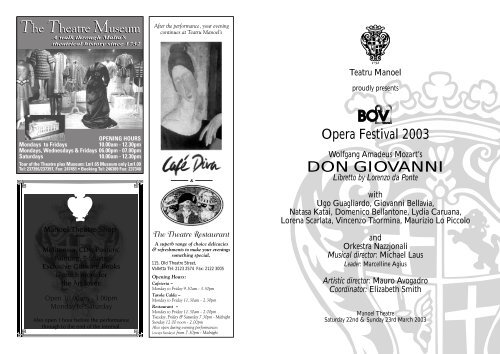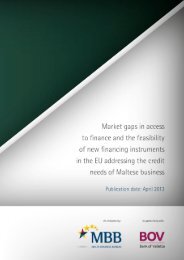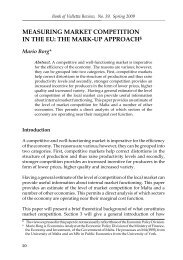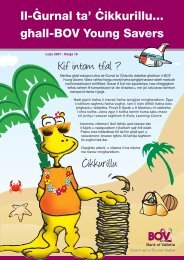DON GIOVANNI - Bank of Valletta
DON GIOVANNI - Bank of Valletta
DON GIOVANNI - Bank of Valletta
Create successful ePaper yourself
Turn your PDF publications into a flip-book with our unique Google optimized e-Paper software.
115, Old Theatre Street,<br />
<strong>Valletta</strong> Tel: 2123 2574 Fax: 2122 3005<br />
Teatru Manoel<br />
proudly presents<br />
Opera Festival 2003<br />
Wolfgang Amadeus Mozart’s<br />
<strong>DON</strong> <strong>GIOVANNI</strong><br />
Libretto by Lorenzo da Ponte<br />
with<br />
Ugo Guagliardo, Giovanni Bellavia,<br />
Natasa Katai, Domenico Bellantone, Lydia Caruana,<br />
Lorena Scarlata, Vincenzo Taormina, Maurizio Lo Piccolo<br />
and<br />
Orkestra Nazzjonali<br />
Musical director: Michael Laus<br />
Leader: Marcelline Agius<br />
Artistic director: Mauro Avogadro<br />
Coordinator: Elizabeth Smith<br />
Manoel Theatre<br />
Saturday 22nd & Sunday 23rd March 2003
Manoel theatre Management committee<br />
Chairman: John Lowell<br />
Acting Chairman: Peter Fenech<br />
Members: Peter Fenech, Chris Gatt, John R. Gatt, Maria Ghirlando, Michael<br />
Laus, Alfred Mallia, Genevieve Mamo, Alfred Spiteri Mallia, Paul<br />
Xuereb, Kenneth Zammit Tabona<br />
Artistic Director: Tony Cassar Darien<br />
Promoters for Operalaboratorio 2002<br />
City <strong>of</strong> Palermo: Diego Cammarata, Mayor<br />
Gianni Puglisi, Director <strong>of</strong> Cultural Affairs<br />
Foundation for the Teatro<br />
Massimo <strong>of</strong> Palermo: Claudio Desderi, Sovrintendente<br />
Gaetano Armao, Vice-President<br />
Roberto Pagano, Artistic Director<br />
Giuseppe Cuccia, Production Coordinator<br />
Management Committee<br />
<strong>of</strong> Operalaboratorio: Elizabeth Smith, Artistic & Academic Director<br />
Dr. Stefano Di Stefano, Administrative Consultant & Accountant<br />
Francesca Pipi, Technical Director<br />
Immacolata Scaccia, Office Manager<br />
The Committee <strong>of</strong> the Manoel Theatre is proud to be associated with these sponsors:<br />
Ministry <strong>of</strong> Finance, Securital Limited, Central <strong>Bank</strong> <strong>of</strong> Malta, Ministry <strong>of</strong> Foreign Affairs,<br />
Corinthia Palace Hotel, Simonds Farsons Cisk plc, Enemalta Corporation, Eden Leisure<br />
Group, AirMalta plc, <strong>Bank</strong> <strong>of</strong> <strong>Valletta</strong><br />
Booking Office: 116, Old Theatre Str., <strong>Valletta</strong>, VLT 07<br />
Opening Hours: Monday to Friday: 10am - 1pm & 5pm - 7pm<br />
Saturday: 10am - 12noon<br />
Reservations: Tel: [+356] 21 246389 Fax: [+356] 21 237340<br />
bookings@teatrumanoel.com.mt<br />
Tickets to be collected within 48 hours.<br />
Payments: Accepted by cash, cheques & credit cards<br />
(Quikcash; Electron; Visa; Mastercard; Eurocard)<br />
Cover photo: Patrick Fenech ® all rights reserved.<br />
Performances start at 7.30p.m. unless otherwise stated. Latecomers have to wait for a suitable pause in the programme before<br />
being ushered to their seats. The Verdi Room in the foyer includes a close-circuit television where one may view the<br />
performance. The management reserves the right to alter the programme and the performance time <strong>of</strong> any production.<br />
1732<br />
TEATRU MANOEL<br />
MICHAEL LAUS<br />
Musical Director<br />
After his early musical training in Malta, Michael<br />
Laus won a scholarship from the Italian Cultural<br />
Institute in order to pursue his studies in piano,<br />
harpsichord, composition and conducting at the<br />
Conservatorio Giuseppe Verdi <strong>of</strong> Milan. Later, in<br />
the United States, he participated in masterclasses<br />
in conducting given by George Manahan.<br />
Besides giving a number <strong>of</strong> recitals in Malta, he<br />
appeared as a pianist in Milan’s Sala Verdi and in<br />
the Teatro San Carlo <strong>of</strong> Naples. As conductor, he<br />
has worked with the Orchestra Filarmonica di Parma,<br />
the Youth Orchestra <strong>of</strong> the Moscow Conservatoire,<br />
the Primavera Ensemble, the New Slovak Radio<br />
Symphony Orchestra, and the Bournemouth<br />
Symphony Orchestra. He has conducted productions <strong>of</strong> Madama Butterfly, Adriana Lecouvreur<br />
and Otello at the Berne State Theatre. In recent years he has been musical director in Manoel<br />
Theatre opera productions: Werther (2001), La Traviata and Così Fan Tutte (2002),<br />
Michael Laus was the Principal Conductor <strong>of</strong> the Manoel Theatre Orchestra from 1991 to 1997.<br />
He is Associate Pr<strong>of</strong>essor in Music Studies at the University <strong>of</strong> Malta and, as from April 1999,<br />
Chairman <strong>of</strong> the National Orchestra. He has recorded orchestral music on CD for the labels<br />
‘Discover International’ and ‘Unicorn-Khanchana’. He is married to Maltese soprano<br />
Miriam Gauci.<br />
ORKESTRA NAZZJONALI<br />
Flute - Rebecca Hall,* Helen Wills<br />
Oboe - John McDonough,* Federico Comoli<br />
Clarinet - Joseph Camilleri,* Tony Galea<br />
Bassoon - Archibald Mizzi,* Mario Micallef<br />
Horn - Emanuel Spagnol,* Etienne Cutajar<br />
Trumpet - Kevin Abela,* Sigmund Mifsud,<br />
Trombone - Roderick Bugeja,* Dennis<br />
Camilleri, Jesmond Azzopardi<br />
Timpani - Joseph Camilleri*<br />
Mandolin - Stephen Zammit<br />
Programme editor: Victor Fenech<br />
1st Violin - Marcelline Agius,** Nadia DeBono,<br />
Stephen Galea, Andrew Borg, Mario Micallef,<br />
Rosanne Dimech, Fiona Giambra, Roberta<br />
Attard<br />
2nd Violin - Stephen Zammit,* Susan Borg,<br />
Mario Ciantar, Stephen Debattista, Graziella<br />
Mizzi, Matthew Fenech<br />
Viola - AnnMarie Chetcuti,* Guido Mamo,<br />
Savio Debono, Mario Frendo<br />
Violoncello - Valeriu Popovici,* Mario Psaila,<br />
Freddie Tonna, Angelica Galea<br />
Double Bass - Carmel Lino Cremona*, Nicholas<br />
Ciantar<br />
Continuo - Salvatore Schinaldi<br />
** Orchestra Leader * Section Leaders<br />
TEATRU MANOEL<br />
1732
<strong>Bank</strong> <strong>of</strong> <strong>Valletta</strong> Group<br />
<strong>Bank</strong> <strong>of</strong> <strong>Valletta</strong> was established in 1974, following the amalgamation <strong>of</strong> a number <strong>of</strong> Maltese<br />
banks with a banking history dating back to 1809. Today, we at <strong>Bank</strong> <strong>of</strong> <strong>Valletta</strong> are Malta’s<br />
largest public company having over 14,000 shareholders and with a sizeable branch network all<br />
over the Islands that services the requirements <strong>of</strong> our esteemed clientele. Our international<br />
network is supported by a number <strong>of</strong> representative <strong>of</strong>fices in Australia, Canada, Italy, Libya and<br />
Tunisia. Being a leading financial services provider, we are involved in providing an array <strong>of</strong><br />
products and services including: retail banking, trade and finance, private / investment banking,<br />
fund management, internet banking, card services, bancassurance and stockbroking amongst<br />
many more.<br />
Apart from the mother company <strong>Bank</strong> <strong>of</strong> <strong>Valletta</strong> plc, the Group is further strengthened by two<br />
subsidiaries, <strong>Valletta</strong> Fund Management and BOV Stockbroking Ltd, and an associate company<br />
Middlesea <strong>Valletta</strong> Life Assurance Co. Ltd. To enhance our competitive edge and expertise fund<br />
management operations and the bancassurance business, we have set up strategic alliances and<br />
joint ventures with local and international financial institutions such as Insight Investments,<br />
Munich Re and Middlesea Insurance. These ventures have created win win scenarios.<br />
Our mission at BOV is to be an innovative, customer centric and creative organisation that<br />
delivers personalised products and services, ensuring excellent careers for our people and<br />
commitment to enhance the prosperity <strong>of</strong> the communities in which we operate. The strategies<br />
we follow and the action we take are designed to create value for all our shareholders and<br />
stakeholders.<br />
<strong>Bank</strong> <strong>of</strong> <strong>Valletta</strong>’s future success depends on including the interests <strong>of</strong> all our stakeholders in<br />
our business: our employees, our shareholders and the wider community where we work and<br />
operate. As part <strong>of</strong> our corporate social responsibility at <strong>Bank</strong> <strong>of</strong> <strong>Valletta</strong>, we are committed to<br />
contribute to the prosperity <strong>of</strong> the communities in which we operate and acknowledge the<br />
responsibilities to invest in these to keep them vigorous and prosperous. This dimension goes<br />
beyond the day to day operations <strong>of</strong> the Group. With the largest share <strong>of</strong> the Group’s community<br />
investment devoted to education, health, welfare and community projects, BOV is also a strong<br />
supporter <strong>of</strong> the arts, culture, sports, heritage restoration and environmental programmes. The<br />
BOV Opera Festival is one such initiative that we look forward to support year in year out.<br />
For further information on <strong>Bank</strong> <strong>of</strong> <strong>Valletta</strong> products and services and our role in supporting<br />
the local communities we operate in, kindly visit our corporate web site or e-mail.<br />
<strong>Bank</strong> <strong>of</strong> <strong>Valletta</strong> p.l.c., <strong>Valletta</strong> Fund Management Limited, BOV Stockbroking Limited and Middlesea<br />
<strong>Valletta</strong> Life Assurance Company Limited are licensed to conduct investment services business by the MFSA.<br />
<strong>Bank</strong> <strong>of</strong> <strong>Valletta</strong> p.l.c. is an insurance sub-agent <strong>of</strong> Middlesea <strong>Valletta</strong> Life Assurance Company Limited<br />
and regulated by the MFSA. Middlesea <strong>Valletta</strong> Life Assurance Company Limited is licensed to carry on<br />
long term business <strong>of</strong> insurance.<br />
1732<br />
TEATRU MANOEL<br />
MAURO AVOGADRO<br />
Artistic Director<br />
Born in Turin in 1951, Mauro attended the<br />
Accademia dell’Arte Drammatica ‘Silvio D’Amico’<br />
in Rome between 1971-71. Soon he was working with<br />
Luca Ronconi, founder <strong>of</strong> the Scuola del Teatro<br />
Stabile di Torino, participating in the preparation<br />
<strong>of</strong> many <strong>of</strong> his shows. These included Arist<strong>of</strong>anes’<br />
Utopia, Ibsen’s Ghosts and Three Sisters, Pier Paolo<br />
Pasolini’s Calderon, Shakespeare’s Measure for Measure,<br />
Simone Weil’s Venezia salva and Kraus’s Gli ultimi<br />
giorni dell’umanità.<br />
In 1987 he started his work as director <strong>of</strong> his own<br />
company, Associazione Culturale Isola, producing<br />
Stravinski’s Histoire du soldat and D’Annunzio-<br />
Malipiero’s Sogno di un tramonto d’autunno. He also directed Goldoni’s Il cavaliere e la dama for<br />
the Festival di Borgio Verezzi (1994), with Annamaria Guarnieri, followed that same year by<br />
Maurice Maeterlinck’s I ciechi and, in 1998, scenes from Tolstoj’s Death <strong>of</strong> Ivan Illic and Marguerite<br />
Duras’s Il Dolore with Marisa Fabbri.<br />
Mauro continued to collaborate with Ronconi on such projects as Berlioz’s La Damnation<br />
de Faust, Janacek’s Il caso Makropulos and Pasolini’s Pilade, for both the Teatro Regio and Teatro<br />
Stabile <strong>of</strong> Turin. For the Opera di Roma he directed L'Arlesiana, and then rejoined Ronconi on<br />
Faust for the Opera Bastille di Parigi and the Scala di Milano.<br />
Since then he has been a very busy director, with works by Donizetti, Verdi, Bellini, Scarlatti<br />
and Giacosa at different locales, both in Italy and abroad. In more recent times he has produced<br />
for diverse companies Thomas Bernhard’s L’ignorante e il folle, J.Goldman’s Il Leone d’inverno, and<br />
M.Frayn’s Copenhagen which, after its debut in Udine, was transferred to a number <strong>of</strong> important<br />
theatres. Between 1996 and 1999 Mauro was artistic director <strong>of</strong> the Festival di Chieri, and since<br />
1997 has been director at the school <strong>of</strong> the Teatro Stabile <strong>of</strong> Turin.<br />
Artistic Director’s Note:<br />
“Is it possible to realise a musical masterpiece such as Mozart’s Don Giovanni for the stage?<br />
The logical response <strong>of</strong> every stage director who dedicates himself to this endeavour should<br />
be in the affirmative. But the present director, a cultivator <strong>of</strong> Mozart for several decades and a<br />
spectator at numerous performances <strong>of</strong> Mozart operas, feels obliged to confess that, perhaps, the<br />
staging narration, whether grand or sober, will always be lacking when confronting the sublime<br />
heights and sublime lows inspired by this masterpiece.<br />
With this in mind, only the enthusiasm <strong>of</strong> young singers, coupled with unbiased producers,<br />
can <strong>of</strong>fer a fertile terrain, thus inducing a director to accept the challenge. In what ‘believable’<br />
context should one convey a story that places its credibility not among the folds <strong>of</strong> the characters’<br />
personalities, or in society’s labyrinthine streets, but solely in the eternal conflict <strong>of</strong> good vs evil,<br />
love vs death, rules vs transgression, all <strong>of</strong> which characterise the human spirit?<br />
To approach all this we decided to draw the epoch <strong>of</strong> the 1700’s <strong>of</strong> Mozart and Da Ponte<br />
nearer to the ‘dolce vita’ <strong>of</strong> the 1960’s – not to actualise, but to discover nearer to ourselves the<br />
same contradictions in a world wavering between its own values and its own infamies. It is a<br />
world in which Don Giovanni is nothing more than a catalyst; he is in fact like a virus the<br />
contaminating force <strong>of</strong> which places everyone’s sacred certainties in discussion. He wages his<br />
obstinate war to place life as a proud rival to the terrible conquerer <strong>of</strong> everyone’s destiny:<br />
inescapable death.”<br />
TEATRU MANOEL<br />
1732
THE PERFORMERS (continued)<br />
1732<br />
TEATRU MANOEL<br />
DOMENICO BELLANTONE, twenty year old tenor, hails<br />
from Reggio Calabria where while still a youngster he began his vocal<br />
studies. Apart from his first choral experiences in operas such as<br />
Menotti's Amahl or Mozart's Così Fan Tutte, his first solo appearances<br />
include Liszt's Missa Choralis, Bach's Wachet auf and Monteverdi's<br />
Vespro della Beata Vergine. He has frequented masterclasses with Romolo<br />
Gazzani (voice) and Gary Graden (choral). He is currently a student at<br />
the University <strong>of</strong> Palermo D.A.M.S. in musicological studies.<br />
LYDIA CARUANA, lyric soprano, made her operatic debut as<br />
Musetta opposite Cecilia Gasdia’s Mimì in La Bohème in 1995. She has<br />
since performed extensively overseas, and has sung the title roles in<br />
Puccini’s Suor Angelica and Isouard’s Jeannot et Colin. In Spring 1997,<br />
as part <strong>of</strong> the bi-centenary celebrations <strong>of</strong> Gaetano Donizetti, she sang<br />
Norina in Don Pasquale. In 1999 she performed at the Edinburgh<br />
International Arts Festival, Scotland, in a concert featuring Mozart,<br />
Handel and Bach at St Giles Cathedral. That same year she sang the<br />
title role in Carmelo Pace’s I Martiri at the Malta Opera Festival and<br />
was then invited to sing for the Millenium celebrations. In November<br />
2001 she sang for the United Nations at the WIPO Centre in Geneva.<br />
She has also sung for the ‘Accademia Internazionale di Scienza e Cultura’<br />
in tribute to celebrated tenor Giuseppe di Stefano, and at a SPAK<br />
Puccini Gala Night opposite tenor Antonio Ordionez.<br />
LORENA SCARLATA, mezzosoprano, made her debut in<br />
1994, aged twenty, in Traetta’s Miserere, debuting two years later as<br />
Fidalma in Cimarosa’s Matrimonio Segreto. But her first major assignment<br />
was in Eliodoro Sollima’s Due Cantate which the composer himself<br />
conducted. In 1997 Gian Carlo Menotti selected her as Mrs.Nolan for<br />
Operalaboratorio’s production <strong>of</strong> The Medium. The following year she<br />
was a finalist in the Di Stefano International Singing Contest in Trapani,<br />
the understudy <strong>of</strong> Suzuki for the Michigan Opera Theatre’s Madama<br />
Butterfly, and made her pr<strong>of</strong>essional debut for Teatro Massimo in Henze’s<br />
Pollicino. This was followed by La Sonnambula, Cenerentola, and, for<br />
Teatro Garibaldi, La Finta Parigina. Last year she had an important<br />
debut in Verdi’s La Traviata in Busseto with Placido Domingo conducting<br />
and Franco Zeffirelli as stage director. Recently she sang in a production<br />
<strong>of</strong> Fioravanti’s Le Cantatrici Villane in Lecce under artistic director Katia<br />
Ricciarelli.<br />
VINCENZO TAORMINA, baritone, studied voice under<br />
Parride Venturi in Bologna and interpretation under Carlo Bergonzi<br />
and has since attended numerous masterclasses. He made his opera<br />
debut in Monteverdi’s Il Ritorno di Ulisse in Patria in Nurnberg, followed<br />
by a Canadian concert tour, in collaboration with the ‘Istituto Italiano<br />
di Cultura’, that took him to Vancouver, Montreal, and Ottawa. He<br />
debuted for Palermo’s Teatro Massimo in their Scarlatti Festival in the<br />
oratorio Davidis Pugna et Victoria and last year won the 56th European<br />
Singing Competition at Spoleto. As a result he debuted for Spoleto in<br />
Gnecco’s La Prova di un’Opera Seria in Budapest, and has also played<br />
Malatesta in Donizetti’s Don Pasquale and Lescaut in Puccini’s Manon<br />
Lescaut.<br />
Foreword by BOV Chairman<br />
It is with great pleasure that I welcome you to the<br />
fourth edition <strong>of</strong> the BOV Opera Festival. I am<br />
pleased that <strong>Bank</strong> <strong>of</strong> <strong>Valletta</strong> has contributed to make<br />
this event a mainstay in Malta’s cultural calendar.<br />
The success <strong>of</strong> the BOV Opera Festival can be assessed<br />
from the ever-increasing audience <strong>of</strong> Maltese and<br />
international opera lovers it attracts year after year.<br />
<strong>Bank</strong> <strong>of</strong> <strong>Valletta</strong> is committed to be a leading patron<br />
<strong>of</strong> local art and culture. The <strong>Bank</strong> has built a<br />
reputation <strong>of</strong> being at the forefront in supporting<br />
Maltese artists. Apart from our sponsorship <strong>of</strong> the<br />
BOV Opera Festival, our contribution to arts and<br />
culture in Malta includes the organisation at our<br />
Head Office <strong>of</strong> a bi-annual retrospective art exhibition<br />
featuring Maltese artists, the financing <strong>of</strong> restoration<br />
projects and support to Maltese artists to exhibit their<br />
works.<br />
This year’s BOV Opera Festival featuring the two prestigious operas “Lucia di Lammermoor”<br />
and “Don Giovanni” together with the Concert by the soloists <strong>of</strong> the Mariinsky Theatre should<br />
prove to be another success. In this regard, I congratulate the Manoel Theatre Management<br />
Committee for its efforts and valuable work to sustain the prestigious quality <strong>of</strong> performances<br />
staged during this festival.<br />
I take this opportunity to wish you all a most pleasant and enjoyable evening at the opera.<br />
Joseph F X Zahra<br />
Chairman<br />
<strong>Bank</strong> <strong>of</strong> <strong>Valletta</strong> p.l.c.<br />
TEATRU MANOEL<br />
1732
1732<br />
MOZART AND ‘<strong>DON</strong> <strong>GIOVANNI</strong>’<br />
[Opera in two acts by Wolfgang Amadeus Mozart with Italian libretto by Lorenzo da Ponte based on another<br />
opera “The Stone Guest” by Giuseppe Gazzaniga. It centres around the legendary seventeenth century lover<br />
Don Juan, and was first performed in Prague on 29th October 1787. The opera was hailed as the world’s<br />
greatest opera at the time it was composed. The critic Stephen Williams has written <strong>of</strong> it,“There is a demonic<br />
power in this music that rises high above the formal, tonic-and-dominant framework enforced by the times.<br />
There is real terror in it; and the final catastrophe will always be an astounding revelation <strong>of</strong> what genius<br />
can do with limited harmonic resources, and a salutary shock to those who regard Mozart merely as a writer<br />
<strong>of</strong> pretty tunes.” This pretty well ties with the statement made by three men well equipped to pass judgement<br />
– Gioacchino Rossini, Charles Gounod and Richard Wagner – namely, that Mozart’s Don Giovanni is<br />
“the greatest opera ever written”.]<br />
TEATRU MANOEL<br />
ACT I<br />
Scene 1: Chased out <strong>of</strong> the house by Donna Anna’s father, the Commendatore, Don Juan engages<br />
him in a duel and unwittingly kills him. Don Ottavio, Anna’s bethrothed, swears vengeance on<br />
the perpetrator.<br />
Scene 2: Don Juan and his faithful servant Leporello overhear a maiden moaning about the lover<br />
who has deserted her. It transpires that the faithless lover is none other than Don Juan. Leporello<br />
makes fun <strong>of</strong> her, saying that she is not the only one – not by a thousand! (Madamina! Il catalogo<br />
e’ questo…)<br />
Scene 3: In the countryside near Don Giovanni’s palace rustics are celebrating the approaching<br />
wedding <strong>of</strong> Zerlina and Masetto. Attracted by Zerlina, Don Giovanni contrives to have Masetto<br />
out <strong>of</strong> the way while he prepares to seduce the willing girl. But the arrival <strong>of</strong> Elvira, Anna and<br />
Ottavio thwarts Don Giovanni’s plans. Anna gets wise to his philandering nature and goads<br />
Ottavio to avenge her father’s murder. He vows he will. Don Giovanni’s answer is to hold a lavish<br />
banquet at his castle at which all the women <strong>of</strong> the land are invited. Zerlina returns meekly to<br />
Masetto and asks forgiveness for having flirted with Don Giovanni.<br />
Scene 4: With the banquet in full swing, the revellers hear Zerlina’s cry for help. Don Giovanni<br />
has made his move after all. The crowd, including Elvira, Anna and Ottavio, rush to her rescue,<br />
but Don Giovanni manages to escape, brandishing his sword in defiance.<br />
ACT II<br />
Scene 1: Don Giovanni is back to his old tricks. He disguises himself as Leporello and lays siege<br />
to Elvira’s maid. And when Elvira herself appears on the balcony it is Leporello who, in his<br />
master’s clothes, takes her <strong>of</strong>f to make love.<br />
Scene 2: Anna and Ottavio bring hard evidence to prove to Elvira that Don Giovanni is a<br />
murderer. Ottavio renews his pledge to avenge the death <strong>of</strong> Anna’s father (Il mio tesoro intanto…).<br />
Elvira however believes herself to be still in love with Don Giovanni, despite the fact that he had<br />
betrayed her.<br />
Scene 3: In the early morning Don Giovanni and Leporello stare at the statue <strong>of</strong> the Commendatore<br />
which the citizens <strong>of</strong> the land had erected in his honour. Don Giovanni mocks him by inviting<br />
him to supper. And in the errie moonlight the statue nods his agreement!<br />
Scene 4: The promise is kept, and in the midst <strong>of</strong> another bout <strong>of</strong> revelry the Man Marble appears.<br />
Just like Banquo at Macbeth’s feast. He stretches out his hand, and Don Giovanni impetuously<br />
grasps it – realising too late that it is the cold hand <strong>of</strong> death. In a scene <strong>of</strong> splendidly overwhelming<br />
music, like an echo <strong>of</strong> the Last Judgement, the Statue calls on Don Giovanni to repent. But the<br />
latter is not prepared to go back on his libertine ways, the creed that had guided him throughout<br />
his life. In the end, marked by apocalyptic music <strong>of</strong> sheer grandeur, the devils arrive to lead the<br />
unrepentant lover to his deserved doom.<br />
THE CAST<br />
in order <strong>of</strong> appearance<br />
Don Giovanni Ugo Guagliardo<br />
Leporello, his servant Giovanni Bellavia<br />
The Commendatore Maurizio Lo Piccolo<br />
Donna Anna, his daughter Natasa Katai<br />
Don Ottavio, her fiancè Domenico Bellantone/Nunzio Gallì<br />
Donna Elvira, a lady <strong>of</strong> Burgos Lydia Caruana<br />
Zerlina, a country girl Lorena Scarlata<br />
Masetto, her fiancè Vincenzo Taormina<br />
Understudy Ivanna Speranza (Zerlina)<br />
Chorus Master Fabio Ciulla<br />
Assistant Chorus Master Salvatore Scinaldi<br />
Chorus Fiammetta Bellanca, Barbara Burger, Roberta<br />
Caly, Oriella Di Noto, Francesca Ferreri,<br />
Simona Naso, Giacoma Sgroi, Valentina<br />
Uccello, Valentina Vitti, Vincenzo Cuccia,<br />
Emanuele Genovese, Giuseppe Esposito,<br />
Salvatore Grigoli, Carlo Terzo<br />
Artistic director Mauro Avogadro<br />
Musical director Michael Laus<br />
Orchestra leader Marcelline Agius<br />
Production co-ordinator Elizabeth Smith<br />
Musical preparation in Palermo Danilo Lombardini<br />
Technical director Francesca Pipi<br />
Set realisation Massimiliano Pipi<br />
Costume design Francesca Pipi<br />
Light designer Bruno Ciulli<br />
Technical lighting assistant Salvatore Bianco<br />
Production director Roberto Spicuzza<br />
Production assistant Gioacchino Sorrentino<br />
Harpsichord Salvatore Scinaldi<br />
Assistant to artistic director Caterina Balistreri<br />
Assistant stage director Sara Chiarelli<br />
Stage manager Giovanni Vallone<br />
Make-up & hair stylist Letizia Tedesco<br />
Carpenters Nadia Campanotta, Alice Passalacqua,<br />
Alfredo Velardi<br />
Property masters Ginevra Tessitore, Gabriella Gallo<br />
Stage maestro Clara Capozza<br />
Lighting maestro Tiziana Nania<br />
Organisation assistants Adriano Fontana, Alice Liberti<br />
Stage crew Marco Cusimano, Anello Gar<strong>of</strong>alo,<br />
Salvatore Marfia<br />
Booking <strong>of</strong>fice Michelle Mangion<br />
Theatre supervisor Charles Ferò<br />
The Management is grateful for the assistance given by H.E. Alvise Memmo, the Ambassador<br />
for Italy, and D.ssa Rosanna Cravenna, Director Italian Cultural Institute.<br />
With special thanks to Sig. Giuseppe Spicuzza (Teatro Orione), Sartoria Pipi and Teatro Stabile<br />
Biondo di Palermo.<br />
TEATRU MANOEL<br />
1732
THE PERFORMERS<br />
UGO GUAGLIARDO, baritone, made his debut in 1998<br />
in Scontrino’s Gringoire at Teatro Politeama, in his native Palermo,<br />
and in Petrassi’s Morte dell’Aria. He was then selected by the Fondazione<br />
Teatro Massimo for roles in Manon Lescaut and Eugenio Onegin, at<br />
the same time completing his piano studies at the Conservatorio<br />
Vincenzo Bellini under Pr<strong>of</strong>. Aurelia Sagnolo. In 1999 he debuted<br />
for Operalaboratorio in Rota’s Una Notte di un Nevrastenico, and sang<br />
and recorded Traetta’s Stabat Mater for Bongiovanni <strong>of</strong> Bologna.<br />
Contracts at the Teatro Massimo followed in Gregoretti’s Una Favola<br />
per Caso, Puccini’s La Bohème and Madama Butterfly, and Weill’s Lady<br />
in the Dark. He participated in a cultural exchange between Operalab<br />
and the city <strong>of</strong> Detroit, studying at the Michigan Opera Theatre,<br />
and will soon complete his degree in philosophy. His next engagement<br />
is with the Teatro Massimo in Verdi’s Macbeth.<br />
<strong>GIOVANNI</strong> BELLAVIA, baritone, likewise made his debut<br />
in 1998 in Scontrino’s Gringoire at the Politeama, followed by Malipiero’s<br />
Capitan Spavento and Petrassi’s Morte dell’Aria, before being selected<br />
by Teatro Massimo for Henze’s Pollicino. At the Michigan Opera<br />
Theatre, in a cultural exchange between Operalab and the city <strong>of</strong><br />
Detroit, he understudied the role <strong>of</strong> Sharples in Madama Butterfly.<br />
Two summer concerts with Teatro La Fenice in Venice followed. In<br />
1999 he debuted for Operalaboratorio in Cimarosa’s La Finta Parigina,<br />
directed by Enzo Dara, which he recorded for Bongiovanni <strong>of</strong> Bologna.<br />
He then figured in Amahl and the Night Visitors and Così Fan Tutte.<br />
Contracted by Teatro Massimo, he has sung in Werther, Tosca, Lady<br />
in the Dark, Davide Re, Rigoletto, Les Contes d’H<strong>of</strong>fmann and most<br />
recently in Il Barbiere di Siviglia with Claudio Desderi conducting.<br />
NATASA KATAI, soprano, started her career in 1993 by<br />
winning prizes in her native Hungary. That same year she made<br />
concert appearances in Rijssen, Delft (in Holland), in Rotenburg<br />
(Germany), and in Messina, Trento and Giarre (Italy). Her first opera<br />
role was at the National Theatre in Szeged as the Countess in Mozart’s<br />
Le Nozze di Figaro. This was followed by roles in Pergolesi’s Stabat<br />
Mater and her university music degree. In 2001 she sang her first<br />
Fiordiligi in Mozart’s Così Fan Tutte in Palermo. Maltese audiences<br />
have heard her before, in the Bellini Recital at Sala Isouard last year.<br />
MAURIZIO LO PICCOLO, bass-baritone, debuted with<br />
the Laboratorio Lirico in 1996 in Vinci’s Erighetta e Don Chilone and,<br />
the following year, with Operalaboratorio in Donizetti’s I Pazzi per<br />
Progetto under the direction <strong>of</strong> Enzo Dara who since then has called<br />
him for Il Filos<strong>of</strong>o di Campagna at Mantova. Since 1999, always for<br />
the Teatro Massimo, he has figured in Rosenkavalier, Manon Lescaut,<br />
Eugenio Onegin, Una Favola per Caso, Rigoletto and most recently in I<br />
Capuleti e I Montecchi. He has sang the role <strong>of</strong> Don Magnifico in<br />
Rossini’s La Cenerentola at the Festival <strong>of</strong> Aix-en-Provence, repeating<br />
the role in Paris and Rouen. Other important engagements include<br />
Rota’s Il Cappello di Paglia di Firenze in Vienna, and Don Basilio in Il<br />
Barbiere di Siviglia in Lyons. He has also debuted Colline in La Bohème<br />
opposite Cecilia Gasdia. Last year he sang Guglielmo in Così Fan<br />
Tutte at the Teatru Manoel.<br />
TEATRU MANOEL<br />
1732







